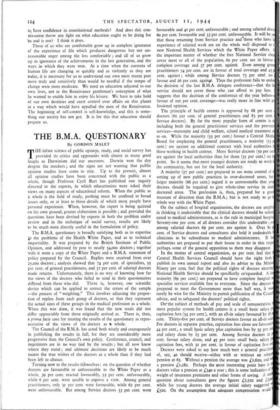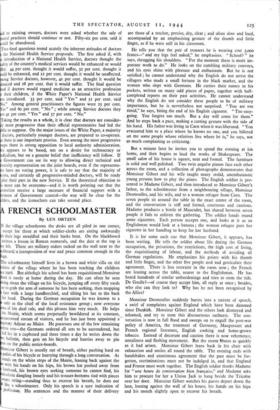THE B.M.A. QUESTIONARY
By GORDON MALET
THE infant science of public opinion, study, and social survey has provided its critics and opponents with almost as many good laughs as Darwinism did our ancestors. Darwin won the day despite the mockers ; and the signs are not wanting that public opinion studies have come to stay. Up to the present, almost all opinion studies have been concerned with the public as a whole, though Professor Cyril Burt has published one inquiry directed to the experts, in which educationists were asked their views on many aspects of educational reform. When the public as a whole is the field of study, probing must be confined to broad issues only, or at least to those details of which most, people have personal experienee. When, however, the expert is being quizzed on his own ground, greater elaboration is possible ; and provided the questions have been devised by experts in both the problem under review and in the technique of social survey, results are likely to be much more directly useful in the formulation 'of policy. THE infant science of public opinion, study, and social survey has provided its critics and opponents with almost as many good laughs as Darwinism did our ancestors. Darwin won the day despite the mockers ; and the signs are not wanting that public opinion studies have come to stay. Up to the present, almost all opinion studies have been concerned with the public as a whole, though Professor Cyril Burt has published one inquiry directed to the experts, in which educationists were asked their views on many aspects of educational reform. When the public as a whole is the field of study, probing must be confined to broad issues only, or at least to those details of which most, people have personal experienee. When, however, the expert is being quizzed on his own ground, greater elaboration is possible ; and provided the questions have been devised by experts in both the problem under review and in the technique of social survey, results are likely to be much more directly useful in the formulation 'of policy.
The B.M.A. questionary is broadly satisfying both as to expertise jo the problems of the Health White Paper, and as to technical impartiality. It was prepared by the British Institute of Public Opinion, and addressed by post to nearly 54,000 doctors ; together with it went a copy of the White Paper and a B.M.A. statement of policy prepared by the Council. Replies were received from over 25,000 doctors ; analysis showed that 74 per cent. of specialists, 55 per cent, of general practitioners, and 57 per cent, of salaried doctors made returns. Unfortunately, there is no way of knowing how far the views of the doctors who failed to send in their questionaires differed from those who did. There is, however, one scientific device which can be applied to correct the errors of the sample- -the process of "weighting." This involves adjusting the propor- tion of replies from each group of doctors, so that they represent the actual sizes of these groups in the medical profession as a whole. When this was done, it was found that the new totals did not differ appreciably from those originally arrived at. There is, then, a prima fade case for treating the results of the questionary as repre- sentative of the views of the doctors as .11 whole.
The Council of the B.M.A. has acted both wisely and courageously in publishing the results in, full, for they are considerably more progressive than the Council's own policy. Conference, council, and negotiators are in no way tied by the results ; but all now know where they stand ; and ultimate decisions are likely to be much nearer the true wishes of the doctors as a whole than if they had been left to chance.
Turning now to the results tI4mselves : on the question of whether doctors are favourable or unfavourable to the White Paper as a whole, 39 per cent. reacted favourably, 53 per cent. unfavourably, while 6 per cent, were unable to express a view. Among general practitioners, only 31 per cent. were favourable, while 62 per cent. were unfavourable. But among Service doctors 53 per cent. were favourable and 41 per cent. unfavourable ; and among salaried doct
6o per cent. favourable and 33 per cent. unfavourable. It will be that those returning from Service practice and 'those who have experience of salaried work are on the whole well disposed to new National Health Services which the White Paper offers. the important matter of whether the free National Service sh cover most or all of the population, 6o per cent. are in favour coriiplete coverage and 37 per cent. against Even among gen practitioners 54 per cent. are in favour of total coverage and 43 cent. against ; while among Service doctors 73 per cent are favour and 26 per cent. againo. Thus the profession fails to end the decision of the last B.M.A. delegate conference—that the service should not cover those who can afford to pay fees. suggests that the 'decision of the conference of the year before favour of too per cent, coverage—was really more in line with fessional opinion.
The Principle of health centres is approved by 68 per cent. doctors (60 per cent. of general practitioners and 83 per cent. Service doctors). By far the most popular form of centre is including both the general Practitioner services and the preven services—maternity and child welfare, school medical treatment so on. While the majority (55 per cent.) favour a Central Medi Board for employing the general practitioners, a majority (53 Cent.) are against an additional contract with local authorities those working in health centres. More Service doctors (5o per cen are against the local authorities than for them (35 per cent.) on point. So it seems that most younger doctors are ready to work f
the community, but not for the local authority. -
A majority (57 per cent.) are prepared to see some control of setting up of new public practices in over-doctored areas, but larger majority (66 per cent.) regard it as unreasonable that yo doctors should be required to give whole-time service in und doctored areas. The profession is, then, prepared for a gra measure of direction than the B.M.A.; but is not ready to go whole way with the White Paper.
On the subject of hospital organisation, the doctors are empha in thinking it undesirable that the clinical doctors should be subo nated to medical administrators, as is the rule in municipal hospi Seventy-one per cent, of all doctors consider this undesirable ; among salaried doctors 69 per cent, are against it. Over So cent. of Service doctors and consultants also held it undesirable clinicians to be' subordinate to medical administrators. If 1 authorities are prepared to put their house in order in this res perhaps some of the general opposition to them may disappear.
In the matter of central organisation, 91 per cent, feel that Central Health Services Council should have the right both publish its own annual report and also its advice to the Mint Ninety per cent. feel that the political rights of doctors entering National Health Service should be specifically safeguarded. A majority (69 per cent.) are prepared to have complete hospital specialist services available free to everyone. Since the doctors prepared to meet the Government more than half way, ft surely be wise for the Ministry to permit publication of the Cou advice, and to safeguard the doctors' political rights.
Ore the subject of methods of pay and scale of remuneration, most popular system for health centres is a small basic salary P capitation fees (34 per cent.), with an all-in salary favoured by 28 cent. Thirty-five per cent. of Service doctors favour an all-in For doctors in separate practice, capitation fees alone are favoured 44 per cent., a small basic salary plus capitation fees by 35 per r and salary alone by i5 per cent. Among Service doctors 20 cent, favour salary alone, and 45 per tent. small basic salary capitation fees, with 31 per cent, in favour of capitation fees Doctors were asked to say how much vett a general practin of, say, 40 should receive—either with or without an ad pension at 65. Without a pension ,the average was £1,620, and a pension £1,280. Perhaps the most interesting point here is doctors value a pension at L340 a year ; this is some indication of weight of insurance premiums and other forms of saving. A question about consultants gave the figures L2,520 and £ while for young -doctors the average initial salary suggested £520. On the assumption that adequate compensation wouki id to existing owners, doctors were asked whether the sale of neral practices should continue or not. Fifty-six per cent, said it uld be abandoned.
Two final questions tested acutely the inherent attitudes of doctors the National Health Service proposals. The first asked if, with introduction of a National Health Service, doctors thought the ality of the country's medical services would be enhanced or would er. 44 per cent, thought it would suffer, 32 per cent. thought it uld be enhanced, and 12 per cent, thought it would be unaffected. ong Service doctors, however, 41 per cent, thought it would be anced and 28 per cent. that it would suffer. The final question -ed if doctors would regard medicine as an attractive profession their children, if the White Paper's National Health Service re introduced. 33 per cent. said " Yes " and 51 per cent. said To." Among general practitioners the figures were 25 per cent. 'es" and 6o per cent. " No " ; while among Service doctors they re 41 per cent. " Yes " and 37 per cent. "No."
aking the results as a whole, it is clear that doctors are consider- ly more progressive than their official representative had led the blie to suppose. On the major issues of the White Paper, a majority doctors, particularly younger doctors, are prepared to co-operate. t there is one important proviso. Even among the most progressive ups there is strong opposition to local authority administration. Is appears to be based, not on a desire for technocracy or dicalism, but on a genuine belief that inefficiency will follow. If Government can see its way to allowing direct technical and iversity representation on the joint boards, even if the representa- es have no voting power, it is safe to say that the majority of tors, and certainly all progressive-minded doctors, will be ready play their part in the new Service. If the theoretical objection to s move can be overcome—and it is worth pointing out that the versifies receive a large measure of financial support with a nimum of Government control—the way will be clear for the ilders, and the iconoclasts can take second place.



























 Previous page
Previous page